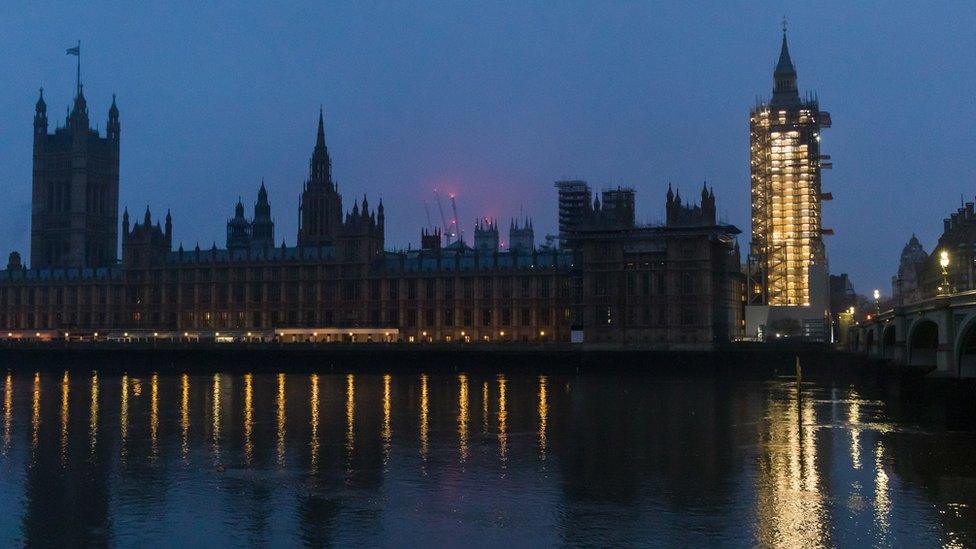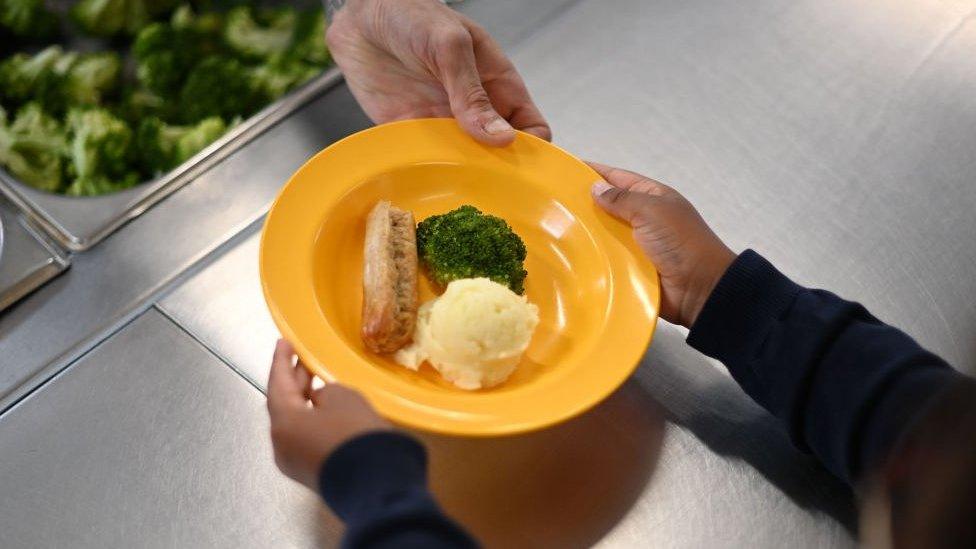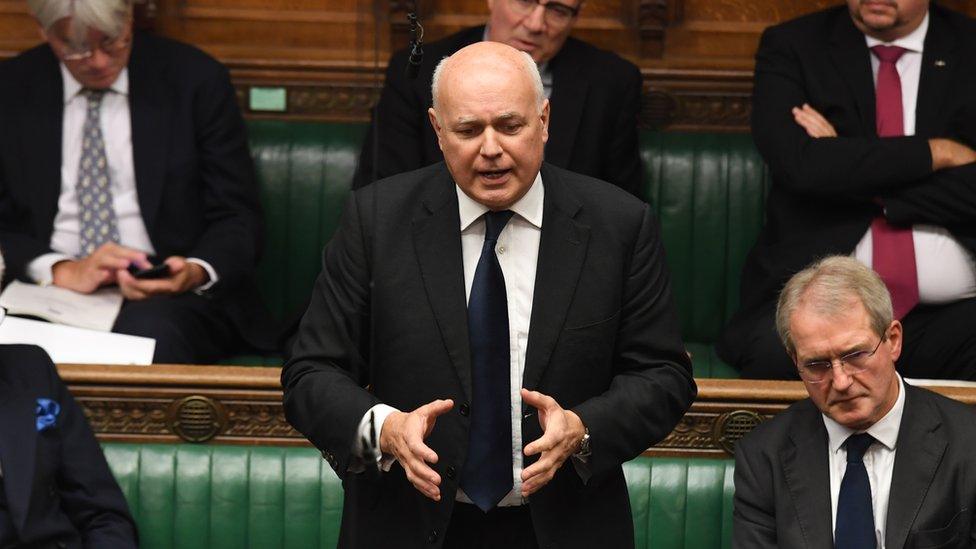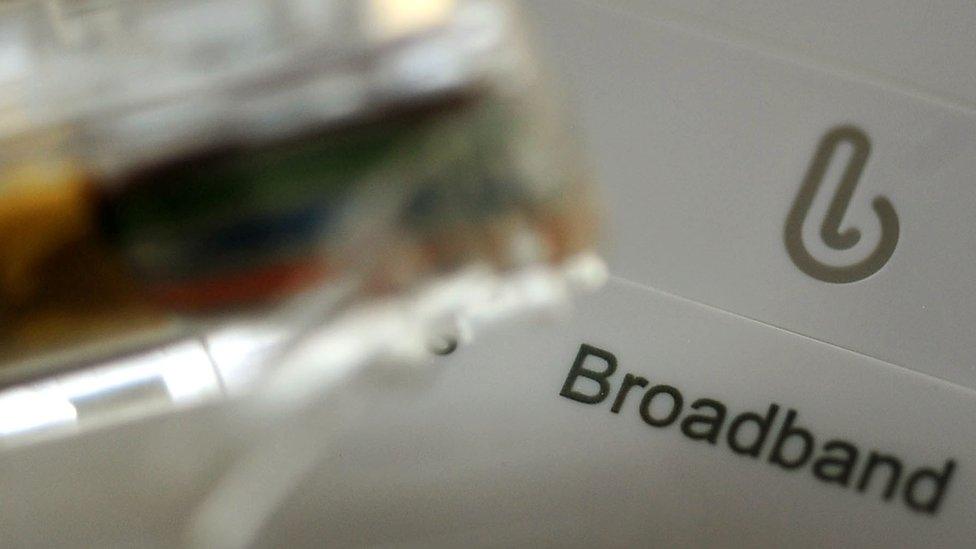The week ahead in Parliament
- Published

It's the first week of the new slimmed down Commons proceedings, after MPs voted to suspend their parallel debating chamber, Westminster Hall, and their Friday sittings to consider Private Members Bills, as an anti-Covid precaution.
There's even a new one-way system operating in the Commons chamber, and intensified precautions are visible across the parliamentary estate.
More to the point, the narrowing of discussion leaves the government calling the shots over most parliamentary activity, and ministers will need to be punctilious about giving the opposition parties and backbenchers sufficient opportunities to make their views heard.
The Commons authorities hope to find a Covid-secure way of resuming Westminster Hall sittings virtually - probably using one of the committee rooms which are already set up for virtual work - but it may take some weeks to get that working.
The problem with Friday sittings is more intractable. A key part of the tactical games around Private Members Bills is the "closure motion" - the requirement for 100 MPs to vote to shut down a debate and make a decision (like moving it on to Second Reading, for example).
The trouble with this is that those 100 MPs have to vote in person, so the proxy vote system - which has allowed absent MPs to vote in most Commons divisions for months - does not apply, and the House authorities are nervous that a vote requiring so many members could become a super-spreader event.
And while a number of wheezes have been suggested, including the idea of allowing Private Members Bills to be given a formal second reading (a rare, but not unheard of practice), the government isn't keen.
The result may be that not enough time is left for the bills to get through - leaving their sponsor MPs with little to show for a lot of work.
But enough of what isn't happening and to the highlights of what is:
Next week, MPs will have China on their mind, with two opportunities for the vocal lobby pushing for a tougher line on Beijing
First, on Tuesday, MPs consider Lords amendments to the Trade Bill, which include an amendment allowing the government to withdraw the UK from trade agreements with countries declared to be committing genocide
Then there's the Tugendhat amendment to the National Security and Investment Bill (see below)
In both cases, there could be some rebellions by Conservative backbenchers, if ministers fail to offer some concessions
There are also some promising-looking select committee hearings, with Northern Ireland Secretary Brandon Lewis looking at a rough ride at the Northern Ireland Committee, over the operation (or non-operation) of the protocol governing trade between Ireland and Great Britain
Monday 18 January
The Commons opens at 14:30 GMT with Education Questions, probably to be followed by the usual Monday crop of urgent questions and government statements.
The main debates are on two Labour Opposition Day motions on politically charged issues.
The first motion is on Universal Credit and Working Tax Credit, where Labour says the government should stop the planned cut to the benefit in April.
The second is on access to remote education and the quality of school meals, with the motion saying families eligible for free school meals should be guaranteed to receive their full value "for the duration of the school year, including during all holidays".
There would normally be debates on public petitions in Westminster Hall, but as noted above, these have been suspended.

Free school meals have been a hot topic throughout the pandemic
On the Committee Corridor at 14:30, Public Accounts focuses on the performance on the Covid-19 test, track and trace system, with evidence from the Department of Health and Social Care Permanent Secretary, Sir Chris Wormald, and Baroness Dido Harding, the Executive Chair of NHS Test and Trace.
At 15:30, the Treasury Committee winds up its inquiry into tax after coronavirus with evidence from Financial Secretary to the Treasury, Jesse Norman, and senior Treasury officials.
And at 16:00, the super-committee on the National Security Strategy hears from the former chief executive of the National Cyber Security Centre Professor, Ciaran Martin.
Over in the Lords from 13:00, ministers field questions on the role of the BBC in the government's international soft power strategy, the review the Airports National Policy Statement (that's from Lord Randall of Uxbridge, who used to represent the seat next to Heathrow - now occupied by a certain Boris Johnson) encouraging a "circular economy" and the elimination of waste, and the situation in Nagorno-Karabakh.
That's followed by a Private Notice Question (Lords-speak for an urgent question) on the TUC report on the Coronavirus Job Retention Scheme, more commonly known as furlough.
There will be a brief Third Reading rubber stamping of the heavily amended Trade Bill, and then peers turn to the second readings of two modest mini-bills - the Non-Domestic Rating (Lists) (No. 2) Bill and the Non-Domestic Rating (Public Lavatories) Bill.
Tuesday 19 January
The Commons begins at 11:30 with Foreign, Commonwealth and Development Office Questions.
The day's Ten Minute Rule Bill from former Cabinet Minister David Davis is on promoting freedom of speech at university and fining universities that allow it to be curtailed.
That is followed by consideration of Lords amendments to the Trade Bill, where the key issue will be a proposal that would force the government to withdraw from any free trade agreement with a country that the High Court had ruled was committing genocide.
The government is opposed and will want to strike the amendment down, but all the opposition parties back it, and Conservative rebels - led by the former leader Iain Duncan Smith - are working hard to get the 40 or so votes they need to defeat the government and keep the change.
The government lost six votes on different aspects of the bill, mostly around either the status of Northern Ireland or around maintaining UK standards in farming and other areas.
Then MPs look at Lords amendments to the High Speed Rail (West Midlands-Crewe) Bill - which will give opponents HS2 another chance to make their criticisms of it.

Iain Duncan Smith will lead the Tory rebels on Tuesday
On the Committee Corridor, Health and Social Care will take evidence from 10:00 on the safety of maternity services in England from patient safety incident investigators from the Health and Safety Investigation Branch.
They will speak about their role in investigating stillbirths, neonatal deaths and suspected brain injuries, and pregnancy-related maternal deaths.
The committee will also hear from maternity care providers, as well as regulators of the nursing, midwifery and obstetrics professions
At 10:30, the Business, Energy and Industrial Strategy Committee will be questioning Kwasi Kwarteng, the new Secretary of State, and Alok Sharma, his predecessor, who is now President of the COP 26 climate change summit.
They will ask about the issues to be addressed at the summit, the Energy White Paper and its contribution to the path to net zero, and issues across the BEIS portfolio, including the impact of Brexit and the support for businesses and workers during the pandemic.
In the Lords at 12:00, peers will question the government on the reduction in diesel use if railways connecting ports and quarries to inland distribution centres were to be electrified, support for people with eating disorders, research into brain tumours and the EU offer to the UK for visa-free touring for musicians in EU member states.
The main legislative action is consideration of Commons amendments to the Pension Schemes Bill
Wednesday 20 January
MPs kick off at 11:30 with half an hour of Northern Ireland questions, followed at 12:00 by Prime Minister's Question Time.
Then, the chair of the BEIS select committee, Labour MP Darren Jones, presents a Ten Minute Rule Bill on internet access, which calls on the government to exercise powers it already has to make broadband affordable for low income families.
He wants them to create a social tariff for broadband and introduce a requirement that every household with a child currently eligible for free school meals would be eligible to access it.
Then MPs turn to the National Security and Investment Bill, where there is an important cross-party amendment proposed by Foreign Affairs Committee Chair, Tom Tugendhat, and signed by - amongst others - Labour's Chris Bryant, the SNP's Stewart Malcolm McDonald and Tory backbench foreign policy expert, Bob Seely.
The amendment aims to define the national interest as it applies to corporate takeovers by foreign companies - for example, whether such takeovers might impinge on national defence or critical infrastructure, or transfer sensitive data, technology or potentially sensitive intellectual property in strategically important sectors outside of the UK.
Given the controversy over Huawei's involvement in the UK digital infrastructure, this will be a significant debate, again led by MPs who want a tougher approach to China.

A new broadband proposal will come to the House floor on Wednesday
On the Committee Corridor, Treasury hears evidence on the economic impact of coronavirus from 14:30, and Northern Ireland hears from Secretary of State Brandon Lewis.
In the Lords at 12:00, minsters will be questioned on the impact of the equalisation of Capital Gains Tax to income tax on entrepreneurs starting new businesses, the wellbeing of children under five and supporting the early years sector affected by the Covid-19 pandemic, and preparations against flooding in England in 2021.
The main debate is on the Second Reading of the Overseas Operations (Service Personnel and Operations) Bill, which creates a new "triple lock" to give service personnel and veterans greater certainty that the unique pressures placed on them during overseas operations will be taken into account when prosecution decisions are made concerning alleged war crimes or other offences.
It provides a presumption against prosecution for alleged offences committed on overseas military operations more than five years ago, which will only be authorised in "exceptional" circumstances, and a requirement for a law officer to agree to a prosecution going ahead.
The bill is highly controversial and there's an imposing speakers list, including former Deputy President of the Supreme Court, Lord Hope of Craighead, former Chief of Staff, Lord Craig of Radley, former Northern Ireland Secretary, Lord Hain, former Solicitor General, Lord Garnier, and human rights lawyer, Lady Kennedy of the Shaws.
Thursday 21 January
The Commons day begins at 09:30 with Environment, Food and Rural Affairs Questions, followed by mini-question times for the MPs who speak for the Church Commissioners, the House of Commons Commission, the Parliamentary Works Sponsor Body, the Public Accounts Commission and the Speaker's Committee on the Electoral Commission.
Then comes the weekly Commons Business Statement from the Leader of the House, Jacob Rees-Mogg.
The day's main debates are on subjects chosen by the Backbench Business Committee - first on Errors in payments made to victims of the Equitable Life scandal, where the motion from backbenchers Bob Blackman, David Davis, Sir Edward Leigh and Dame Margaret Hodge criticise the handling of the payments.
They will call on the Public Accounts Committee and the Public Administration and Constitutional Affairs Committee to set up a joint inquiry into the accuracy of the payments.
The second debate is on the operation of the child maintenance service during the Covid-19 pandemic.
In the Lords at 12:00, ministers will field questions on the G7 Summit, due to be held in the UK in 2021, on ensuring heritage organisations have supplies of locally produced coal, and on the new UN Treaty on the Prohibition of Nuclear Weapons.
That is followed by brief Third Reading debates on the Covert Human Intelligence Sources (Criminal Conduct) Bill and the Medicines and Medical Devices Bill, before peers turn to the detail of the (relatively uncontroversial) Air Traffic Management and Unmanned Aircraft Bill.
